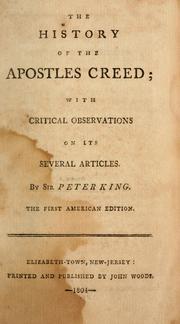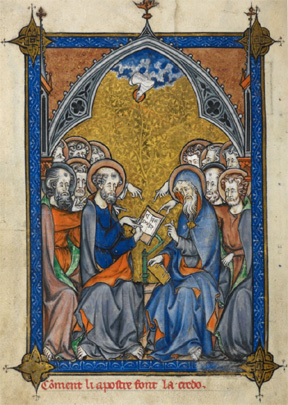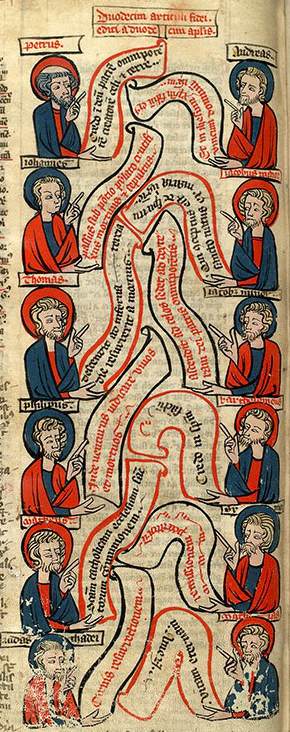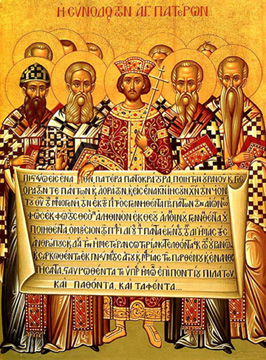Creed of the Apostles

Apostles' Creed
Reference to an Apostles' Creed appears for the first time in a letter, probably written by Ambrose, from a Council in Milan to Pope Siricius in about 390 AD. "Let them give credit to the Creed of the Apostles, which the Roman Church has always kept and preserved undefiled".
Siricius[1] was elected Bishop of Rome and was the first to issue decretals and would later be called the Pope. His first was the Directa decretal which claimed apostolic origin for clerical celibacy.[2] These Decretals were a departure from the Doctrines of Jesus regarding exercising authority one over the other.[3]
But what existed at that time was not what is now known as the "Apostles' Creed", but a shorter statement of belief that, for instance, did not include the phrase "maker of heaven and earth", a phrase that may have been inserted only in the 7th century.

Authorship and authority
This illumination from a 13th-century manuscript shows the apostles writing the Creed under the inspiration of the Holy Spirit, with each of the twelve contributing one of the articles, was already current at that time.
There appears to be no truth to this made-up story.
The Ambrose who had written Siricius was elected by the voice of the people as bishop of Milan. But these voters were “instant Christians”,[4] formed at the emperor’s command, not by repentance but by government order to be baptized. These just-add-water converts would alter Christianity.
Ambrose was the son of the governor of Gaul and a former high Roman official. He had asked the emperor if he could become Bishop of Milan, and he was granted that right by this self-appointed Bishop of Bishops. Before Ambrose could accept this position, he had to take time to research what Christianity was, for he had no idea. He returned some time later with his own doctrines.

Ambrose who is often listed as Patristics author of this new church and was considered a bishop as an “aristocratic figure”, and he formulated the Church according to the “ways of Rome issuing decrees, edicts, and commands”, rather than serving as a subject, minister, and servant of the people. He also displayed a fierce hatred of women that was carried into the middle ages.
He was intolerant of other religions, and he actually argued in the Roman Senate that all other religions should be stamped out. This seems in direct opposition to the teachings of Jesus. The idea that other religions should be persecuted by Roman force and policy seems to fly in the face of the injustice of the Crucifixion itself.
- “Touch not; taste not; handle not; Which all are to perish with the using; after the commandments and doctrines of men?” Colossians 2:21-22
These people, by a majority vote, chose a single, top-down ruling bishop for thousands and, at the command of a tyrant and his Edict of Milan, were not Christians of repentance, although, they may have been baptized with water and fanfare.
The Milan Church and its hierarchy of authority was established by the spirit and character of Constantine, not by Christ. Much of what we see as the Church today has come down through this tainted religion and apostasy. To understand the Church and its position in the Kingdom of God, we must go back to its origin, which is Christ, not Constantine.
- “Ye are bought with a price; be not ye the servants of men.” 1 Corinthians 7:23
The Early Church was much different than the Modern Christians and their Churches.
While much of what is in the Creed may be true, it is a distraction from what Christ said about being a Doer of the word. The Early Christian and what they did was in Conflict with Rome. Many of the modern Churches preach a way that has more in common with the Corban of the Pharisees that made the word of God to none effect, rather than aligning with the Early Church and its daily ministration.
I know that:
- Matthew 24:5 For many shall come in my name, saying, I am Christ; and shall deceive many.
- Matthew 7:7:21 Not every one that saith unto me, Lord, Lord, shall enter into the kingdom of heaven; but he that doeth the will of my Father which is in heaven. Many will say to me in that day, Lord, Lord, have we not prophesied in thy name? and in thy name have cast out devils? and in thy name done many wonderful works? 23 And then will I profess unto them, I never knew you: depart from me, ye that work iniquity.[5]
Nicene Creed

The term "Creed" used to mean 'I engage'. It was supposed to be a personal profession of your deeply held opinion which provoke you to action. Any official creed of the the Holy Church established by Jesus the Christ should consist only of the words of Christ and the Doctrines of Jesus since the Church was "founded and established by Jesus Christ, to receive, preserve, and propagate his doctrines and ordinances" and He granted no authority to exercise control over the faith of the people. The Holy Spirit is to be our guide and comforter.
Where did God grant the right of anyone the authority[6] to impose their opinion on anyone else?
Alexander of Alexandria sought to excommunicate Eusebius as a heretic until Eusebius submitted and agreed to the Nicene Creed at the First Council of Nicea in 325.
The original
The original Nicene Creed was first adopted in 325 at the First Council of Nicaea. At that time, the text ended with the words "We believe in the Holy Spirit", after which various anathemas against Arian propositions were added.
The Second Ecumenical Council held in Constantinople in 381 as a modification of the original Nicene Creed of 325 produced the "Niceno-Constantinopolitan Creed" or the "Nicene-Constantinopolitan Creed". It also came to be very commonly known simply as the "Nicene Creed". It is the only authoritative ecumenical statement of the Christian faith accepted by the Roman Catholic, Eastern Orthodox, Oriental Orthodox, Anglican, and the major Protestant denominations.
The Creed of the Apostles and Athanasian creeds are not as widely accepted. The Apostles' Creed makes no explicit statements about the divinity of the Son and the Holy Spirit, but, in the view of many who use it, the doctrine is implicit in it.
What about the creed?
Who is to define and explain it?
Is not agreeing on how it is applied an important thing?
We believe that agreeing as to the meaning of the creed is dependent on agreeing with Christ through the Doctrines of Jesus. That is a process that may require mutual rebuke and reproof amongst men and women over a long time. The agreement we seek comes in time as we seek the kingdom of God and His righteousness... The Church is a system in which you may seek the way of Christ.
Joining the Church or a Church does not make your salvation real. Dividing people over their personal opinions concerning the Doctrines of Jesus vs the doctrines of men seems to be against the teachings of Christ. It is joining with Christ in spirit and in truth that we must seek. The Church should never come between the spiritual engagement of that connection to the Holy Spirit sent by Christ through faith.
Creed of the Comforter
A Holy Creed Study
http://www.hisholychurch.org/creed.php
Creeds and Conclusions http://www.hisholychurch.org/creed2.php
Creed notes in PDF. http://www.hisholychurch.org/creednotes.pdf
Hebrews 11:6 But without faith [it is] impossible to please [him]: for he that cometh to God must believe that he is, and [that] he is a rewarder of them that diligently seek him.
See also:
The Apostles' Creed
https://preparingyou.com/wiki/Apostles_Creed
Nicene Creed
https://preparingyou.com/wiki/Nicene_Creed
Religion |
Pure Religion |
Private welfare |
Fleeing Religion |
False religion |
Public religion |
Our Religion |
Christian conflict |
Corban |
Baptism |
Benefactors |
That Word |
Daily ministration |
Modern Christians |
Diocletianic Persecution |
Christians check list |
gods |
Judge not |
Judge |
Fathers |
Deist |
Damnable heresies |
Factions at the altar |
Pharisees |
Sadducees |
Zealot |
Essenes |
Levites |
Messianic Judaism |
Menahem the Essene |
Sanhedrin |
Altars |
Clay and Stone |
Red Heifer |
Golden calf |
Freewill offerings |
Religion |
Pure Religion |
Public religion |
Christian conflict |
Paganism |
Denominations |
Dispensationalism |
Benefactors |
Corban |
Daily ministration |
Calendars |
Cult |
Imperial Cult of Rome |
Guru theories| |
Covet |
Merchandise |
Mark of God |
Mark of Cain |
Mark of the Beast |
Nature of the Beast
Section 666 |
Benefactors |
Biting one another |
Cry out |
Worship |
Church |
Temples |
Religious Orders |
Priests |
Kings and priests |
Hear |
Bible Index |
Network |
If you need help:
- Or want to help others:
Join The Living Network of The Companies of Ten
The Living Network |
Join Local group |
About |
Purpose |
Guidelines |
Network Removal
Contact Minister |
Fractal Network |
Audacity of Hope |
Network Links
Footnotes
- ↑ Siricius was supposedly the first to bear the title Pontifex Maximus
- ↑ It complained that clerics (deacons, priests, and bishops) were still living with their wives and having children, thus contravening the Council of Elvira which was only attended by 19 bishops and a few elders. It has been claimed that it produced 36 Canons but only about 21 of them were considered authentic, the rest were added later. Canon 33, enjoining celibacy upon all clerics, married or not, and all who minister at the altars was clearly added later for the purposes of controlling the funds given to Churches.
- ↑ Not exercise authority
- Matthew 20:25 "But Jesus called them unto him, and said, Ye know that the princes of the Gentiles exercise dominion over them, and they that are great exercise authority upon them. But it shall not be so among you:..."
- Mark 10:42 "But Jesus called them to him, and saith unto them, Ye know that they which are accounted to rule over the Gentiles exercise lordship over them; and their great ones exercise authority upon them. But so shall it not be among you:..."
- Luke 22:25 "And he said unto them, The kings of the Gentiles exercise lordship over them; and they that exercise authority upon them are called benefactors. But ye [shall] not [be] so:..."
- ↑ Instant Christians. Just add water. Baptism with water but no real repentance. "Then Peter said unto them, Repent, and be baptized every one of you in the name of Jesus Christ for the remission of sins, and ye shall receive the gift of the Holy Ghost." Acts 2:38
- ↑ Lord, Lord
- Matthew 7:20 "Wherefore by their fruits ye shall know them. 21 Not every one that saith unto me, Lord, Lord, shall enter into the kingdom of heaven; but he that doeth the will of my Father which is in heaven.22 Many will say to me in that day, Lord, Lord, have we not prophesied in thy name? and in thy name have cast out devils? and in thy name done many wonderful works? 23 And then will I profess unto them, I never knew you: depart from me, ye that work iniquity. 24 Therefore whosoever heareth these sayings of mine, and doeth them, I will liken him unto a wise man, which built his house upon a rock: 25 And the rain descended, and the floods came, and the winds blew, and beat upon that house; and it fell not: for it was founded upon a rock. 26 And every one that heareth these sayings of mine, and doeth them not, shall be likened unto a foolish man, which built his house upon the sand:"
- Matthew 25:11 "Afterward came also the other virgins, saying, Lord, Lord, open to us. 12 But he answered and said, Verily I say unto you, I know you not. 13 Watch therefore, for ye know neither the day nor the hour wherein the Son of man cometh."
- Matthew 25:26 "His lord answered and said unto him, [Thou] wicked and slothful servant, thou knewest ... Take therefore the talent from him..."
- Matthew 25:44 "Then shall they also answer him, saying, Lord, when saw we thee an hungred, or athirst, or a stranger, or naked, or sick, or in prison, and did not minister unto thee? 45 Then shall he answer them, saying, Verily I say unto you, Inasmuch as ye did [it] not to one of the least of these, ye did [it] not to me."
- Luke 6:46 "And why call ye me, Lord, Lord, and do not the things which I say? 47 Whosoever cometh to me, and heareth my sayings, and doeth them, I will shew you to whom he is like: 48 He is like a man which built an house, and digged deep, and laid the foundation on a rock: and when the flood arose, the stream beat vehemently upon that house, and could not shake it: for it was founded upon a rock. 49 But he that heareth, and doeth not, is like a man that without a foundation built an house upon the earth; against which the stream did beat vehemently, and immediately it fell; and the ruin of that house was great."
- Luke 13:25 "When once the master of the house is risen up, and hath shut to the door, and ye begin to stand without, and to knock at the door, saying, Lord, Lord, open unto us; and he shall answer and say unto you, I know you not whence ye are: 26 Then shall ye begin to say, We have eaten and drunk in thy presence, and thou hast taught in our streets. 27 But he shall say, I tell you, I know you not whence ye are; depart from me, all [ye] workers of iniquity. 28 There shall be weeping and gnashing of teeth, when ye shall see Abraham, and Isaac, and Jacob, and all the prophets, in the kingdom of God, and you [yourselves] thrust out."
- John 13:13 "Ye call me Master and Lord: and ye say well; for [so] I am. 14 If I then, [your] Lord and Master, have washed your feet; ye also ought to wash one another’s feet. 15 For I have given you an example, that ye should do as I have done to you. 16 Verily, verily, I say unto you, The servant is not greater than his lord; neither he that is sent greater than he that sent him. 17 If ye know these things, happy are ye if ye do them."
- Galatians 6:7 "Be not deceived; God is not mocked: for whatsoever a man soweth, that shall he also reap."
- 1 John 4:20 "If a man say, I love God, and hateth his brother, he is a liar: for he that loveth not his brother whom he hath seen, how can he love God whom he hath not seen?"
- ↑
- Matthew 20:25 "But Jesus called them unto him, and said, Ye know that the princes of the Gentiles exercise dominion over them, and they that are great exercise authority upon them. But it shall not be so among you:..."
- Mark 10:42 "But Jesus called them to him, and saith unto them, Ye know that they which are accounted to rule over the Gentiles exercise lordship over them; and their great ones exercise authority upon them. But ye shall not be so:..."
- Luke 22:25 "And he said unto them, The kings of the Gentiles exercise lordship over them; and they that exercise authority upon them are called benefactors. But ye [shall] not [be] so:..."